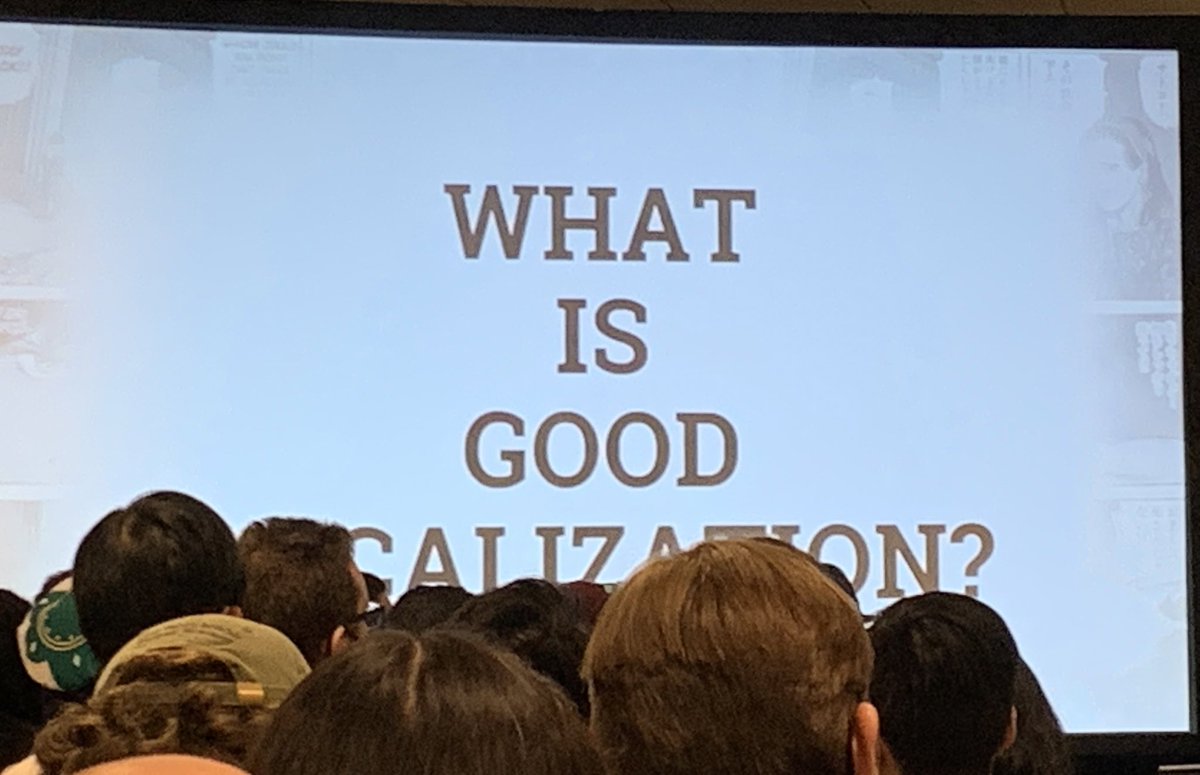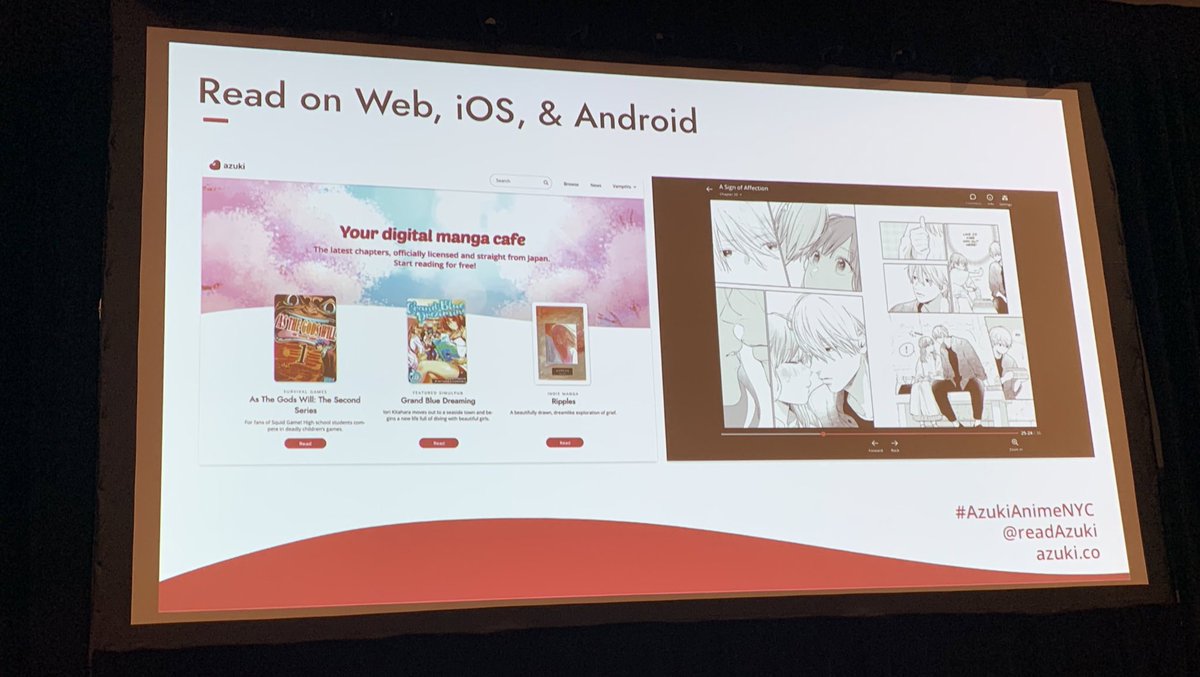
Next up for me at #AnimeNYC, the Localize This! Panel, feat. a Mt. Rushmore of localization, @ZackDavisson, Carl Horn, Mari Morimoto, Lynzee Loveridge, & @OkazuYuri! It’s a full house! 





Mari’s been in the business so long she gets 2 slides! She’s been in the industry three years longer than Carl Horn! 😎🔥 



What is localization! The word itself is superfluous, but without localizers you don’t read manga in English! It is a translator who writes the phrases we latch onto and assign meaning to. 





Localizers get a lot of unfair hate. But Mari got to work on Naruto because fans didn’t like the translation for the first volume, even though it was the adapter who probably made the choices who angered the fans. 😅 

What is bad localization? Lynzee’s perspective as a reader is when it feels unnatural, especially noticeable in auto translation. For Erica, it’s when there’s no voice to the characters, which happens when there’s no adaptors or editors. Though Mari’s worked with an 

Erica is one of Carl’s role models. He admires her for her scholarship and dedication and her as a punisher. Erica says she’s blushing from the compliments and asks him to stop. 😂
Carl comments on how sometimes prefer awkwardness because they feel it’s more authentic. But Japanese readers aren’t reading manga and thinking “oh boy, this sure feels like authentic Japanese!” You should be mindful of your characters and the localization will grow organically.
What is good localization? Erica believes it’s a seamless reading experience, where you’re not thinking about it. Lynzee concurs that it should be immersive. 

Carl and Mari come from an era where full retouch of SFX was the norm, a time when letterers were paid more than editors. Sometimes they had to unbind Japanese volumes for clean files to work off of. Retouching can take forever, Erica once spent 3 days retouching a single panel.
Carl remembers one letterer who smoked so heavily you could still smell the smoke when he turned in his pages.
Nowadays folks use subtitles, but Carl still directs his letterers to make them look like the Japanese and pay attention to their placement. Erica says some of the best letterers today really get that.
Erica gives shout-outs to Sara Linsley and to Jeannie Lee’s lettering on Boys Run the Riot and Rose of Versailles!
Zack reflects on how Kitaro had its own original font made for the localization. Original, handmade fonts are a great asset to recapture a specific, unique look for the lettering in a series!
Zack believes a good localization doesn’t need to use the same words as the Japanese. If the words needed to be shifted in English to recapture emotion and meaning, you should. Especially with humor, which often doesn’t work the same in pacing between languages.
Erica gives a shout-out to David Evelyn’s work on Kaiju No. 8 and how hems able to recreate the series’ tone and feel!
Mari gets very annoyed when she’s asked to dumb down a reference in a manga that editors may think American readers wouldn’t understand. Zack disagrees, he doesn’t like using slang in his books in particular, it takes him out of it.
Does Media Make a Difference? Zack hates translating games because you just get blocks of text and can’t latch on to anything. Mari dislikes the extra work when she isn’t given a script when she has to translate a video.
Audience makes a big difference in different media. The Squid Game translation debacle has led to a lot of backseat translators. Lynzee notes that social media has definitely added stressors to the translator’s job.
Translators often get ridiculous blame and hate for choices not made by them. A la what happened with the Netflix Evangelion translation. And harassers pushed Caleb to stop posting his threads on new MHA and Stone chapters and go private.
Mari says she may lose job opportunities because she’s not on social media, but she stays off for the sake of her mental health. Alternatively, Zack may lose job opportunities because he’s on Twitter! 😂
Carl reflects on when he interviewed the Honneamise director where he was trying to lead him to comment disparagingly on the dub, but he was more positive than he expected and helped him reframe his thoughts of localization more philosophically.
Mari comments that the Japanese communities she works with often are just happy to see Japanese properties get embraced by and adapted by Hollywood. But there are different perspectives between Japanese people and Japanese-Americans to keep in mind too.
Carl muses how we localize things when we don’t even realize it, we often don’t see a lot of things as a product of a different culture.
Mari was in Japan when Dragon Ball Evolution was coming out, and the poster’s tag line was “Shueshia wa bikkuri” which had a lot of nuanced meaning - was Shueshia shocked? Surprised? Positively? Negatively? You could take it many different ways.
Erica comments that in-group-ism is a common problem too, as she observed when she went to the Maria-Sama ga Mitterru screening.
Couldn’t get into my next planned panel so taking some time to finish posting my notes!
Localizer lightning round questions! First up, Honorifics or No Honorifics? Zack hates them, Erica believes there’s a time and place for them, Mari always consults the editor first - it’s literally not in her hands. (Cont.) 

Lynzee feels like it would feel natural in samurai, action, or historical manga, but it feels off when it comes across overly polite - better to let nuance carry it. Carl says it depends on the series for him. Zack also believes the work should determine it.
Translation notes! Zack says that if he has to use one he feels he’s failed as a translator. Mari says author’s notes should be preserved, but does sometimes take out references that English readers would get.Erica’s a big fan of notes when they would make sense for the audience. 

Zack believes manga is not meant to educate folks about Japanese culture, but Erica and Mari disagree, and Erica brings up My Brother’s Husband as an example as a book that was written to explain gay culture to straight Japanese readers. 

Q&A! When asked about thoughts on notes in the back, most agreed they are a good idea to not interrupt the flow of the book. Mari hopes that digital books will do better to make sure to retain them, as sometimes they don’t.
Q&A! How do they handle alliteration? Japanese doesn’t really have it, so Zack handles it on a car by case basis. Mari tries to find equivalent words or structures. Her favorite example about that is Killer B’s rapping in Naruto. 😂
Post-panel question! Zack mentioned that translators notes are usually something translators take upon themselves to do, and they’re paid the same page rate for them as a regular comic page, so it’s usually more time consuming for the translator to do than it’s worth pay wise.
Was so glad I could meet and say hi to @ZackDavisson & @OkazuYuri after the panel and get to meet @Toukochan in person for the first time! Cons are so crazy that I always relish when I can actually cross paths with folks I know online but rarely get a chance to meet in person. ^^
I was also hoping to say hi to Mari and greet Carl and Lynzee too, but alas a full room being cleared into a busy hallway is just too much chaos to parse folks out in 😅 Hopefully next time. Really glad I could finally attend one of Carl’s panels though! He’s such a great orator!
*Though Mari’s worked with an adaptor when she worked on different series by a certain famous rom-com author who would use the same voice for all her series just because they were done by the same person. (Just realized this comment was cut off in the previous tweet 😅)
*on how some fans sometimes prefer awkwardness
• • •
Missing some Tweet in this thread? You can try to
force a refresh

































